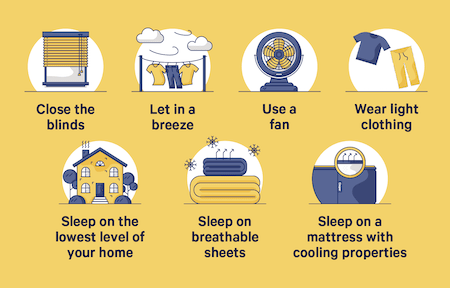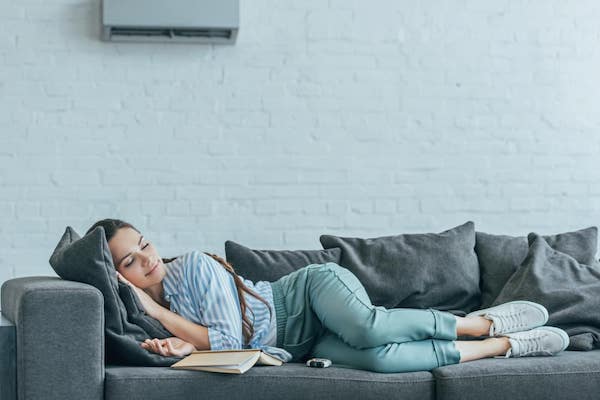Last Updated on Sunday, May 5, 2024 by Maven Carlson
When the temperatures start rising, it’s important to keep your bedroom cool. Not only can a hot and stuffy room make it hard to fall asleep, but sleep quality will suffer too. Keep things comfortable in your sleeping area by setting your air conditioner at around 70°F. This is the ideal temperature for sleeping; any higher or lower could interfere with restful sleep.
This article is about how to sleep better. It talks about the best temperature for your air conditioner when sleeping, how temperature affects your sleep, and tips for a good night’s rest.
Best Air Conditioner Temperature for Sleeping

For the best restful sleep, it’s important to maintain a comfortable temperature in your bedroom. Generally speaking, the ideal temperature for sleeping is around 70°F (21°C). Keeping your air conditioner at this level should help you fall asleep faster and stay asleep longer. Don’t let it get too cold either; temperatures below 60°F can make it difficult to drift off.
How Temperature Affects Sleep
Our bodies have something inside called a circadian rhythm. It helps us know when to sleep and when to wake up. If we get too hot, it can be hard to sleep because we will feel uncomfortable. If we are too cold, our body may not have enough energy to warm us and this makes it hard to sleep. To help get better rest set the air conditioner at 70°F – this is the perfect temperature for sleeping well.
In addition to keeping your bedroom cool, there are other things you can do to get good rest. Try avoiding caffeine close to bedtime and set a consistent bedtime every night. Steer clear of screens at least 30 minutes before going to sleep, as this could disrupt your circadian rhythm. Exercise during the day can also help you get more restful sleep, so don’t forget about that either!
Risks of sleeping with AC
Sleeping with an air conditioner can be good, but there are some risks too. ACs can make the air dry and hard to breathe, which is bad for people who have allergies or asthma. Use a humidifier or open windows to keep the air from getting too dry. Also, dust and allergens can build up in your AC machine over time. Make sure you get it serviced regularly so this does not happen.
Benefits of sleeping with AC
Having an air conditioner in your bedroom can help you stay cool and sleep better. It will make it easier to fall asleep because of the noise reduction. An AC can also help with allergies and asthma by reducing dust in the air. Finally, having a consistent temperature helps your body know when it is time to sleep and stay asleep longer.
Sleeping Tips for Sound Sleep

- 1. Keep the temperature of your bedroom cool and comfortable by setting your air conditioner at around 70°F.
- Avoid caffeine close to bedtime, and steer clear of screens for at least 30 minutes before going to sleep.
- Burning candles, spraying a special smell, or putting essential oils in the air can help your brain know that it is time to go to sleep.
- Exercise during the day can help you get more restful sleep, so don’t forget about that either!
- Use a humidifier or open windows to keep the air from getting too dry if using an AC unit.
- Get your AC serviced regularly to make sure dust and allergens do not build up in it over time.
- Drinking certain drinks can help you sleep. These include herbal tea, cherry juice, and milk.
- To make your bed comfortable, use miracle sheets and blankets that are made of natural fibers. Wash them often to make sure they stay clean.
By following these tips, you can enjoy better quality sleep all through the summer months and beyond! With a suitable AC temperature and other sleep hygiene habits, you can create a relaxing sleep environment and make it easier to fall asleep.
FAQ: Best AC Temperature for Sleeping
What is the best temperature for sleeping with an air conditioner?
The ideal temperature for sleeping with an air conditioner is around 70°F (21°C). Keeping your AC at this level should help you fall asleep faster and stay asleep longer.
Are there any risks to sleeping with an AC unit?
Using an AC unit while sleeping can be risky. It can make the air dry, making it hard to breathe. Dust and allergens can also build up in the machine if it’s not serviced often. Use a humidifier or open windows to keep the air moist. Get your AC checked regularly too.
Are there any other tips for getting better sleep?
Set your AC to 70°F in your bedroom to keep it cool. Don’t drink coffee close to bedtime and stay away from screens for 30 minutes before you go to sleep. Exercise during the day and drink herbal tea, cherry juice, or milk before bed. Use miracle sheets and blankets made of natural fibers for a comfy bed, then wash them often so they are always clean.
Is sleeping in AC good for the skin?
Sleeping in a cool room is good for your skin. It can reduce inflammation and keep it hydrated. But make sure the room isn’t too cold. Use a humidifier or open windows to make sure your skin stays healthy and doesn’t get too dry during summertime.
Is sleeping in AC good for hair?
Sleeping in a cool room is good for your hair. It can help keep it looking healthy and reduce frizz. Don’t make the room too cold or it can cause dryness and split ends. Use a humidifier in summer to help keep your hair hydrated.

Leave a Reply